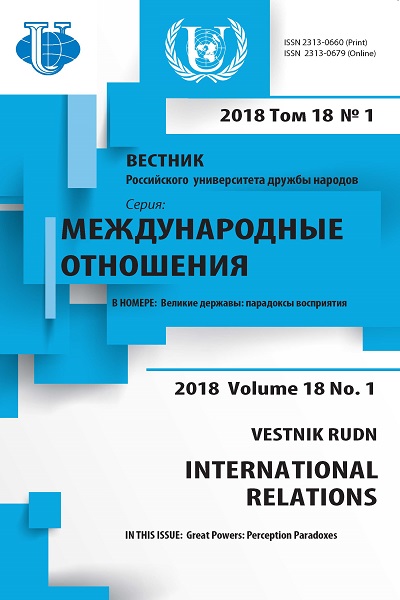RUDN University and Latin-Caribbean America: new directions of interaction in the educational sphere
- Authors: Borzova A.J.1, Medina Xavier G.V.1
-
Affiliations:
- RUDN University (Peoples’ Friendship University of Russia)
- Issue: Vol 18, No 1 (2018): Great Powers: Perception Paradoxes
- Pages: 208-220
- Section: INTERNATIONAL EDUCATIONAL COOPERATION
- URL: https://journals.rudn.ru/international-relations/article/view/18387
- DOI: https://doi.org/10.22363/2313-0660-2018-18-1-208-220
Cite item
Full Text
Abstract
The article analyzes the international cooperation of the Peoples’ Friendship University of Russia (RUDN University) in the field of higher education and science, shows its role in training highly qualified personnel from Latin America and the Caribbean, with a special focus on Ecuador. The purpose of the article is to show the cross-section of the Latin American contingent of pupils at the present stage on the basis of a comparative analysis, and for this purpose are set the following tasks: to identify new priorities in education that are in demand in modern society and are embodied in the PFUR, to show the importance of the internationalization of education as one of the factors ensuring educational cooperation for RUDN University. The task is also to show the cooperation of the Ecuadorian government and RUDN University in the preparation of competitive specialists for the implementation of ambitious plans for the country’s development, identify the features of the Yachai project for the development of Ecuador’s scientific potential, and outline the prospects for bilateral interaction in the training system. Conclusion: for 58 years of its activity PFUR has achieved significant results in the internationalization of education, developed interesting methods of teaching Russian and other subjects, introduced the study of a number of subjects in English, which made this university attractive for foreign, in particular, Latin American students.
About the authors
Alla Jur’evna Borzova
RUDN University (Peoples’ Friendship University of Russia)
Author for correspondence.
Email: borzova_ayu@rudn.university
Doctor of History, Associate Professor of the Department of Theory and History of International Relations of the RUDN University
González Vinicio Medina Xavier
RUDN University (Peoples’ Friendship University of Russia)
Email: medina_gv@rudn.university
postgraduate student, Assistant of the Department of Theory and History of International Relations of the RUDN University
References
- Borzova, A.Yu. (2014). Approaches of Brazil to the problem of education. In: BRICS: cooperation for development: materials of the IV International Scientific Conference. Moscow, May 28, 2014. Moscow: RUDN University, 146—151. (In Russ.).
- Borzova, A.Y. & Volosyuk, O.V. (2009). 50 Years of Collaboration: Peoples’ Friendship University of Russia and the Universities of Latin America. RUDN Journal of World History, (2), 93—100. (In Russ.).
- Davydov, V.M. (Ed.) (2009). Ecuador on the road to the “Civil Revolution”. Moscow: ILA of RAS. (In Russ.).
- Ermolieva, E.G. (2014). Education in Latin America: adaptation to the challenges of time. Moscow: ILA of RAS. (In Russ.).
- Filippov, V.M, Krasnova, G.A. & Lukichev, G.A. (2011). PFUR-50 years: experience in training for developing countries in the world. Rector of the university, 1, 30—37. (In Russ.).
- Filippov, V.M. (2015). Internationalization of Higher Education: Major Trends, Challenges and Prospects.Vestnik RUDN. International Relations, 15(3), 203—211. (In Russ.).
- Jameson, K. (1997). Higher Education in a Vacuum: Stress and Reform in Ecuador. Higher Education, 33 (03), 265—281.
- Koldunova, E.V. & Lounev, S.I. (2017). The processes of transformation of the education system and science in Asia in the estimates of international organizations and transnational ranking agencies. Vestnik RUDN. International Relations, 17(1), 190—200. doi: 10.22363/2313-0660-2017-17-1-190-200. (In Russ.).
- Plan Nacional de Desarrollo 2017—2021. Toda una Vida © Secretaría Nacional de Planificación y Desarrollo — Senplades 2017 Quito — Ecuador. URL: http://www.planificacion.gob.ec/wp-content/uploads/downloads/2017/10/PNBV-26-OCT-FINAL_0K.compressed1.pdf (accessed: 25.11.17).
- Ponce, J. & Loyaza, Y. (2012). Elimination of User-fees in Tertiary Education: A Distributive Analysis for Ecuador. International Journal of Higher Education, 1 (1), 138—147.
- Pyatakov, A.N. (2017). The victory of Lenin Moreno in Ecuador. Latin America, 6, 17—27. (In Russ.).
- Rusakova, O.F. (2010). The concept of “soft power” in modern political philosophy. Scientific Yearbook of the Institute of Philosophy and Law of the Ural Branch of the Russian Academy of Sciences, 10, 173—192. (In Russ.).
- Savala, P.A.C. (2014). Landmarks and achievements of the “Decent Life” plan. Latin America, 3, 56—74. (In Russ.).
- Volosyuk, O.V. & Marchuk, N.N. (2009). PFUR and Latin America — 50 years of cooperation. Moscow: RUDN. (In Russ.).
- Zvyagina, D.A. (2012). “Soft power”: structural analysis. Initiatives of the XXI century, 3, 135—137. (In Russ.).











